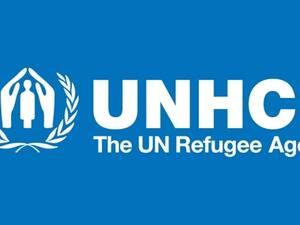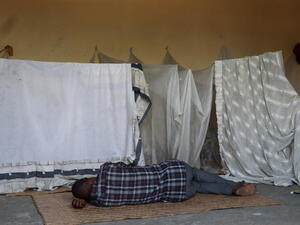Lake Chad: new violence, new displacement
Lake Chad: new violence, new displacement

Business activity on eastern shore of Lake Chad where life goes on in Chad despite the insurgency
BAGA SOLA, Chad, Sept 24, (UNHCR) - Lake Chad isn't really a lake any more.
The encroaching Sahara desert has turned most of it into a mass of low-lying islands as far as the eye can see, encircled by creeks and swamps.
Thousands of years ago, this body of water covered a million square kilometres - that's larger than the modern-day Caspian Sea.
Today Lake Chad is also something else. It is the epicentre of waves of violence and suffering that are spreading into the four countries it borders.
The lands near its shores are dotted with UNHCR-run refugee camps, housing people made homeless by the violence in the region.
The core problem is Nigerians fleeing the insurgency in the north east of Africa's most populous nation.
"Boko Haram attacked our village; we had no choice but to leave," is a refrain heard over and over from the Nigerians now taking refuge in camps in Chad, Cameroon and the Republic of Niger.
In recent months, a new phenomenon has also begun.
Chadians, Cameroonians and citizens of the Republic of Niger have themselves been made homeless in large numbers by a combination of insurgent attacks spreading out from Nigeria, and the response to those attacks from the armies of the four nations bordering Lake Chad.
In Nigeria alone, there are now as many as 2.15 million Internally Displaced People (IDPs). The UNHCR's previous working figure of 1.4 million IDPs was revised upwards in early September after monitors were deployed across Nigeria to gather more accurate data.
In addition, the total number of people who have been made homeless by the Boko Haram-linked crisis across the four nations of the Lake Chad region is now over 2.5 million.
This total includes the following IDPs: Nigeria - 2,150,451; Niger - 50,000; Cameroon - 81,693; Chad 68,434.
The total number of refugees in Niger, Cameroon and Chad is 172,690.
The new phenomenon taking hold around Lake Chad goes something like this:
The insurgents terrify the population on the islands, or around the edges of the Lake.
Then the armies tell the people to leave certain locations, for their own safety, so the insurgents can be dealt with without civilians getting in the way.
These "evacuations" began earlier this year when the army of Niger Republic emptied the Lake Chad islands that are part of its territory of people.
"The islands belonging to Niger are now almost completely free of civilians", said a senior UN Refugee Agency, UNHCR, official familiar with the terrain; "there's hardly anyone left there at all".
Something similar happened in Cameroon - although, because Cameroon doesn't have many islands on the Lake, it took place on the mainland, near the water.
A series of suicide bombings began in July on northern Cameroonian towns near the Lake. These attacks were blamed by the authorities in Cameroon on Boko Haram.
In response, the Cameroon army told Nigerians living in Cameroon without official papers to return home to Nigeria.
The latest wave of displaced people is here in Chad. They're arriving in an area on the northern eastern shore of the Lake beween between the village of Baga Sola and the regional capital Bol, also near the water but two hours drive away.
The displaced come mostly from Chadian islands on the lake. They've been told by their government and army it is not safe to stay there.
Most of these people have nothing - they're short of food, shelter and medical attention. They sit under the harsh sun - and the violent rains of this current wet season - with the flimsiest of shelters made from twigs, leaves and scraps of cloth.
Some have been given plastic sheeting by the UN refugee agency, UNHCR and about a thousand families have been handed some very basic kitchen items - such as buckets and saucepans.

Lake Chad isn't really a lake any more. Most of it is islands and inlets
UNHCR's partners like Medecins Sans Frontiers and the International Medical Corps are also working hard in difficult, remote circumstances.
But the displaced are desperate. They have tried to make shelters by stretching domestic mosquito bed nets over twigs.
In the past month, according to the Chadian government, a little over 27,000 people have arrived from the Lake Chad islands belonging to Chad to seek refuge on the mainland.
That surge brings the total number subsisting between Baga Sola and Bol to some 68,000, the Chadian authorities say.
These figures are Chadian government estimates. But the UNHCR Representative in Chad, Antonio Jose Canhandula, believes them to be "very credible".
Chari Abdou, a 21 year old woman, and her 15 year old sister Hadjia, are among the Chadians displaced directly by the insurgency.
"Boko Haram came to our village in Cameroon and they said they would kill us if we didn't follow them", said Chari Abdou between nervous smiles.
"They marched us to the border with Nigeria. They had guards at the front and the back of us", she continued; "we had no choice".
The insurgents were apparently intent on taking the young women to a base inside Nigeria.
But the sisters were lucky. A Chadian army patrol came across the group before it crossed the border.
There was a fight and in the ensuing confusion.
, the sisters found themselves in the hands of the Chadian army who subsequently gave them over to the care of the UN childrens' agency, UNICEF.
Chari and 15 year-old Hajia are also lucky that they're not living on the side of the Baga Sola- Bol road under the shelter of nearly-useless leaves or mosquito nets.
Along with 37 other unaccompanied youngsters they're living in a UNICEF plastic sheeting shelter in a relatively-shaded corner of Baga Sola village.
They are receiving limited assistance and medical care.
Like other displaced nationals or refugees I met in the area, Chari and Hadjia Abdou are determined to make their lives as 'normal' as possible.
Most of the group of 39 youngsters saved by the Chadian army and now living together in Baga Sola didn't know each other before they were brought together by the UN.
But now they chat and laugh together. The girls and women plait each others' hair. The boys collect wood for cooking,
But most of all Chari and Hadjia Abdou want to return to the 'normal' of their families.
After telling their story of capture and escape the sisters said there was one thing they now wanted above all else;
"We want to find our parents", said Chari.
Hadjia, 15, silently nodded in agreement with her big sister.
By Mark Doyle, Lake Chad








